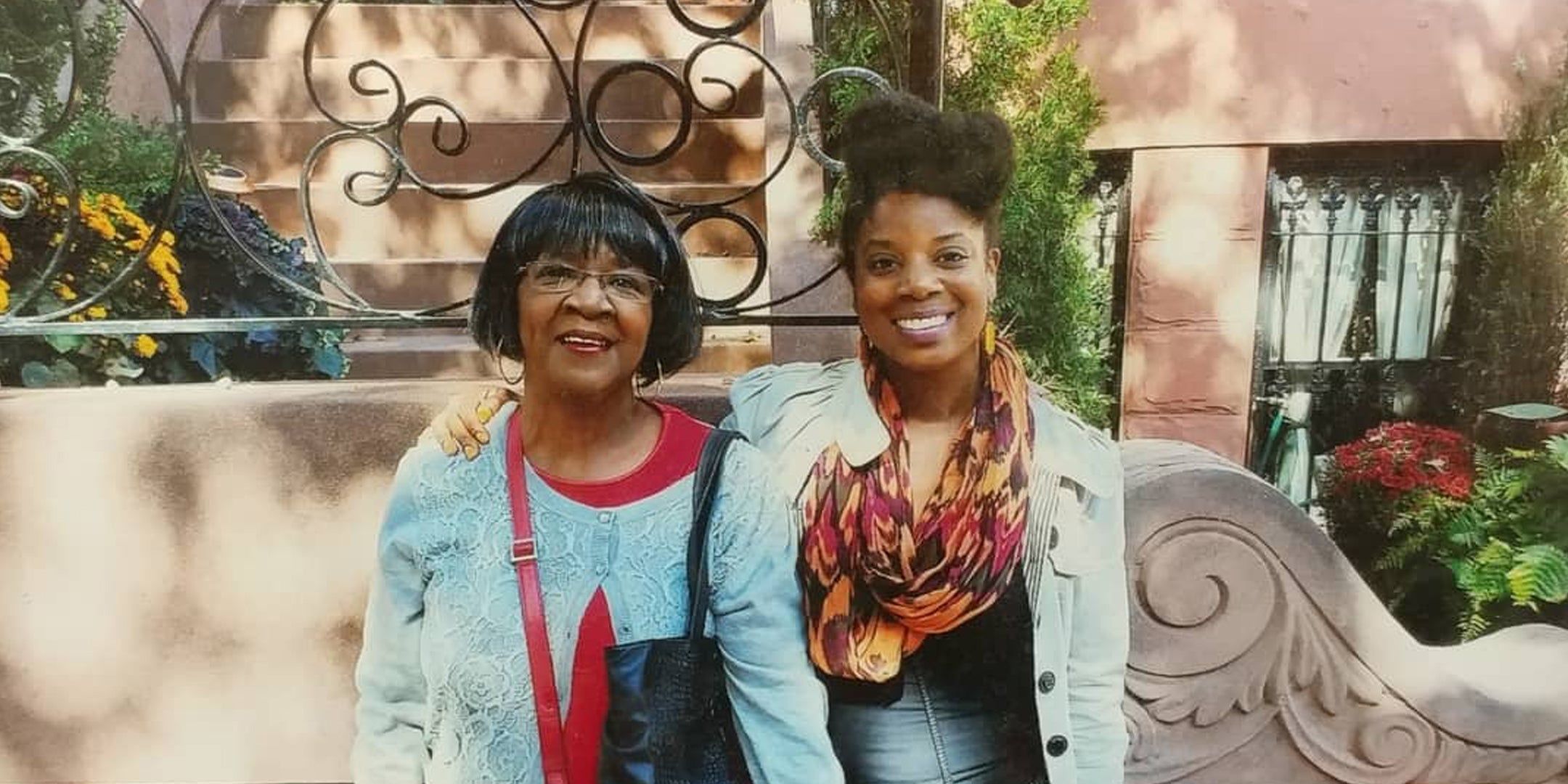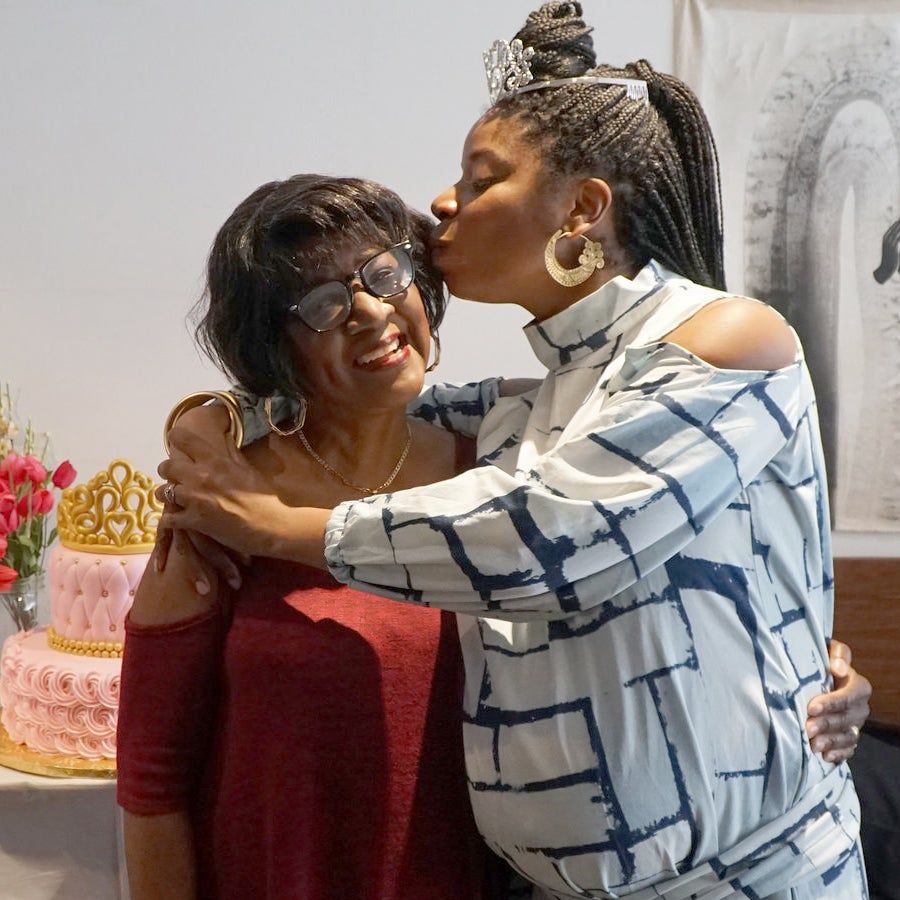
It's Personal
How to Thank a Dead Mother
Idrissa Simmonds-Nastili explores an alternate reality where her retired mother moves in with her young family and begins to heal after a lifetime of work and worry.
- Written By
- Idrissa Simmonds-Nastili
I have a frequent fantasy: In the months following my father’s death from dementia, my grieving mom packs up her life in Vancouver and heads to California. She moves in with me and my family to live out her retirement years. Mom takes the second bedroom and my spouse and I share our room with our infant daughter. After the arrival of our second child, we move into a bigger house where mom has her own wing. As the years pass, my children grow up beneath the steady light of their Nini. After school, they run to Nini’s wing to tell her about their days, and my mom either shoos them away if she’s on the phone with her last living sister, or welcomes them in if she’s in the mood to chat. Inevitably, she ends up telling my children one of her many stories about growing up in Bed Stuy with her six siblings, punctuating each tale with the deep belly laugh I know like gospel. She takes early evening walks with our neighbor, another Black woman who grew up in New York. Mom and the neighbor stop at the rose garden to rest their bodies and fill their lungs with all that fragrant beauty. She sleeps in as late as noon if she wants, making up for the years spent waking up at four a.m. to make the bus on time for her job as an office assistant. The hard skin of her knuckles softens as decades of dishwashing slough away. A few times each year, she goes on an adventure with her sister: They see the Acropolis in Greece. They pose with Mona Lisa at the Louvre. They make their long-awaited journey to Haiti to see the town where their mother grew up. Mom takes long visits with my brother and sister and her other grandchildren. Her sleep is uninterrupted by worries about money, health, or work.
There is a singular point to this fantasy: my mother is chilling. Lounging on a settee like some buxom woman from a Renaissance painting. She’s healing after a lifetime of the bent back and tightened brow that come with worries over money and physical illness. Worry that almost upended her. For the next twenty years, pleasure is her life. Over this time, the devastation of the loss of her spouse shifts to the shape of acceptance. And then, at the age of ninety, when these last two decades of rest and sweetness and sunsets have charged the balance of the preceding years of caring for an ailing husband and surviving three bouts of cancer and raising babies, my mother passes peacefully in her sleep, surrounded by her generations. She dies of the miracle of a long and full life. End beautiful scene.
In reality, three months after my father’s death, my mother died of colon cancer. There were no retirement vacations. No items crossed off the bucket list. She died just barely on the other side of her retirement, after years of caring for a sick spouse. In hospice, my siblings and I took turns rubbing Vaseline into my mother’s hands to ease the cracking of her skin. That was four years ago. My head still reels.
I can’t tell anymore if my fantasy helps my healing process or hinders it. The fantasy is so clear I can smell the roses my grief has conjured. I can rub the stems between my fingertips and count on the peace that their texture brings to lull me to sleep. The fantasy feels as true as my name. It is an exercise in both grief and joy: I delight in hearing my mother laugh again while lounging on a sunny day, and weep that this image exists only in my head, or in an alternate realm I can see so clearly but never enter.
I can tell you this: the fantasy is selfish. It is one where I get to express all the gratitude I have nowhere to put. I ask this of myself, of my siblings, and of other members of the desperate club I now belong to:
How does one repay a beloved and dead mother?
She was good. She was a mirror. She was flawed – sometimes we yelled and fought and gave one another the silent treatment. She also loved me and my siblings fiercely and punctuated this love with a work ethic and commitment to advocating for us that knew no bounds. I had her long enough to move beyond feeling angry with and embarrassed by her, to knowing how good I had it.
I cringe at the past versions of myself. The me who felt ashamed of her first job working at a discount retail store after years of going through the immigration process. The me who, at about eight, sat silently in the back of a school friend’s car as their mother drove me home. I don’t remember why this mom brought me home on this day; I usually rode the bus. But I remember the words she said: “Your mother needs to get out there and have a car. I always see her at the bus stop.” I sat in the back seat, furious and confused by the ease with which this woman spoke of acquiring a car, feeling oddly exposed at the thought of her driving past and judging my mother as she waited for the bus. In that moment I felt neither protected by my mother, nor capable of protecting her.
Sometimes, I feel the shadow of my mom in my own body. I’ll find her in the way I walk up the steps, or sigh heavily when getting into bed. I’ll especially find her when I am with my children. Tonight I spent the evening cuddling my four-year-old on the couch as she sniffled through a cold. As I held her to my side, I saw me in her and my mother in me. I remembered how my mother buried everything: her rage, her disappointment, her fear. She was loud when it came to her love and standing up for her family, but silent when it came to her fears. I would find glimpses of these emotions in the way the dishes would bang in the sink as she washed them, or how she sucked her teeth beneath her breath as she rolled her hair at night. But she never allowed her complexities to live out loud. Everything was swallowed like food. She hoarded her most complex emotions because she thought it would protect her children from fear or pain, and I often wonder if this led to her illnesses. On my lap, my daughter sniffles and whines. “You want to tell me how you feel?” I ask her. I am constantly inviting her to uncork herself. Helping my children speak their truths is one language I have found for saying thank you to my mother – she would want nothing more than to see her grandbabies be free.
It’s not enough.
How do I say thank you? At the end of her life, my mother prayed constantly. She talked of God like a friend, and I wonder if this was her way of reconciling the anger and fear and grief that I saw in her face. Her faith promised her an afterlife of rest. I struggle with this: I wanted her to experience that rest in life.
Still, she was sure that God heard her. Now, I wonder if I can make my pain loud enough for her to hear it, if my choice not to swallow my rage might give me a direct line to her. There is a precision I want to have in naming what is happening in my life, in my body, in my worries and in my obsessions that feels like the best way I can say thank you to a dead mother. She would be happy, I believe, to see me learning from her in this way. Whatever time I have on this earth, I will not allow unspoken pain to shorten it. I want to feel what I feel and name it when it hurts. I want my children to do the same.
My youngest, at two, will just gather the air in his body and scream out his emotion. This is a lesson. Maya Angelou wrote “to describe my mother would be to write about a hurricane in its perfect power.” I am aiming to be a mother who is the quietest sort of hurricane: one who tells her children the truth about what she is feeling. Children are so deeply intuitive, they feel into the truth anyway. My daughter will ask me every now and then if I am sad. If I am sad, I’ll tell her that yes, I am, and why it is so. She accepts this with the same ease with which she accepts my joy or my excitement, used to having a mother who does not swallow the pageantry of motherhood and instead opts for the often-tattered truth.
I am beginning to wonder if my fantasy of my mother’s last years is how I practice possibility, imagining an unwritten future where my mother lives out a wildly verbose and abundant life. A life with less sacrifice and more sacred ritual. My mother is dead, and still, I imagine a conversation we never got to have. “Mom,” I tell her over the phone, “you don’t have to work anymore. You can rest. We’ve got you.”
“I know Babygirl,” she says, laughter in every word. “I’m ready to put it all down.”
This is where I leave her, putting it down. If I am really to say thank you for what she gave me in life, I will put my load down next to hers, and shout my pain. I won’t wait for my children to grow into adulthood and tell me to do so.
Idrissa Simmonds-Nastili

Idrissa Simmonds-Nastili is a poet, essayist, and fiction writer at work on her first novel. Her work has appeared in Black Renaissance Noire, The Caribbean Writer, Fourteen Hills Press, and elsewhere. She is the 2014 winner of the Crab Creek Review poetry contest, and a NYFA and Commonwealth Short Story Award Finalist.